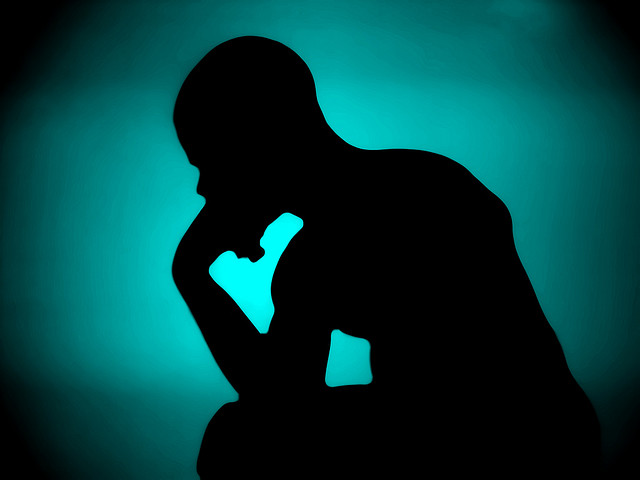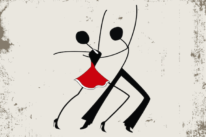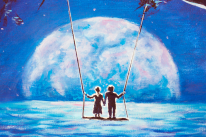
“The quality of your life is in direct proportion to the amount of uncertainty you can comfortably deal with.” ~Tony Robbins
I drive my wife nuts. She has absolutely no trouble deciding how she feels or what she likes and dislikes. For me, those decisions don’t come easily.
She loves comparing notes with people about their favorite movie, favorite dessert, you name it. I can never pick just one. When someone asks me what I think, the answer’s almost always some version of “It all depends.”
This puts me at a disadvantage when my wife and I argue. Not only is she quite certain of her position; she always seems to have an arsenal of facts at hand to defend it. Pondering where to even start my response, I used to feel my only option was just to give in.
I’d rationalize, well okay, if you’re so sure and I can’t make up my mind, it must be more important to you, so what the heck, you win. Alas, the story of my life!
For Every Answer, a Question
Don’t get me wrong; I really envy my wife for her clarity of thought. I wish I could make decisions without first having to let facts and feelings percolate for a while. I wish I could be sure enough about an issue to be willing to go to bat it.
For as long as I can remember, I’ve seen this reticence as a handicap. But in the past decade or so, at last, I’ve found a way to free myself of that burden—I’ve decided it’s actually a strength.
After all, I’m thinking, isn’t the world a more interesting place when the conversation doesn’t necessarily end at one person’s version of the truth?
Wouldn’t life be dull if there weren’t for every ideologue, a skeptic; for every answer, a question; for every teacher, a student?
I realize I can’t stop being the student. And that’s okay.
Learning’s a funny thing. For some people, it’s clearly the means to an end. You learn so you can know; you know so you don’t have to listen to anyone any more.
Not me. The more I learn, the more certain I am that I don’t know everything. I guess you could say asking questions is more important to me than being right.
Giving myself permission to be ambivalent has been liberating. Ironically, it seems to have actually emboldened my thinking in a way.
Not that I make decisions any more easily; but I’m coming more and more to not just tolerate, but actually believe in my view that, in life, absolutely nothing—including this statement—is absolute. It all depends on how you look at it.
The Nature of Seeing
As an art major, an architecture student, and a graphic designer in a previous life, my stock in trade—like that of any creative person—has been perspective, looking at things in new ways, seeing angles, patterns, and details that I might orchestrate to catch the eye and the fancy.
Anyone can make something interesting out of shapes, but a designer will try doing it while also making something of the space between the shapes. While everyone expects a view from the front or side, we’ll try a view from above. Others might expect to see the whole thing, but a designer will find a telling detail and make a stunning graphic from that.
For creative people, not deciding things too quickly is essential. Being willing to leave the “doors” of decision open is what enables us to keep our perspective fluid, moving freely from one conceptual “room” to another, exploring those fresh points of view. That willingness, that openness, is the very heart and soul of creativity.
Ambivalence as a perspective is particularly helpful when it comes to how we perceive nature. I think this is why I’m blessed with my ability to see the details. When I notice something, I don’t necessarily think of that as a complete experience. I don’t stop looking
When you try different angles from which to approach things, different lenses to see them and different dimensions to understanding them, it nurtures your curiosity and wonder, and gives you points of access to nature—both sensory and spiritual—where there might otherwise be none.
You can go to the wilderness, but if your mind’s so bounded by focus, so girded by certainty, that you miss all the surprises, are you really fully there?
A Plan
Nowadays, when my wife and I argue—now that I’ve stopped beating myself up about my indecisiveness—I’ve figured out a new strategy that doesn’t give away the store, one that feels more true to who I am. First, I let her know that I understand how frustrating this will be for her, and then I tell her I need a day or two to reflect on my thoughts and feelings.
The idea is that this lets me decide what’s important to me. But its real beauty is that, at least in theory, by the time the two days is up, chances are whatever it was we’d been arguing about won’t seem that important anyway.
I suppose you’re going to ask me if this new strategy works. Well, of course, it all depends.
Photo by Atiim Jones Photography
About Jeffrey Willius
Jeffrey Willius is a Minneapolis writer. His blog, One Man’s Wonder, is about paying attention, making time for discovery and wonder, and appreciating little things. It's about valuing learning more than knowing. And it's about faith—in ourselves and in a higher power.













 Though I run this site, it is not mine. It's ours. It's not about me. It's about us. Your stories and your wisdom are just as meaningful as mine.
Though I run this site, it is not mine. It's ours. It's not about me. It's about us. Your stories and your wisdom are just as meaningful as mine. 